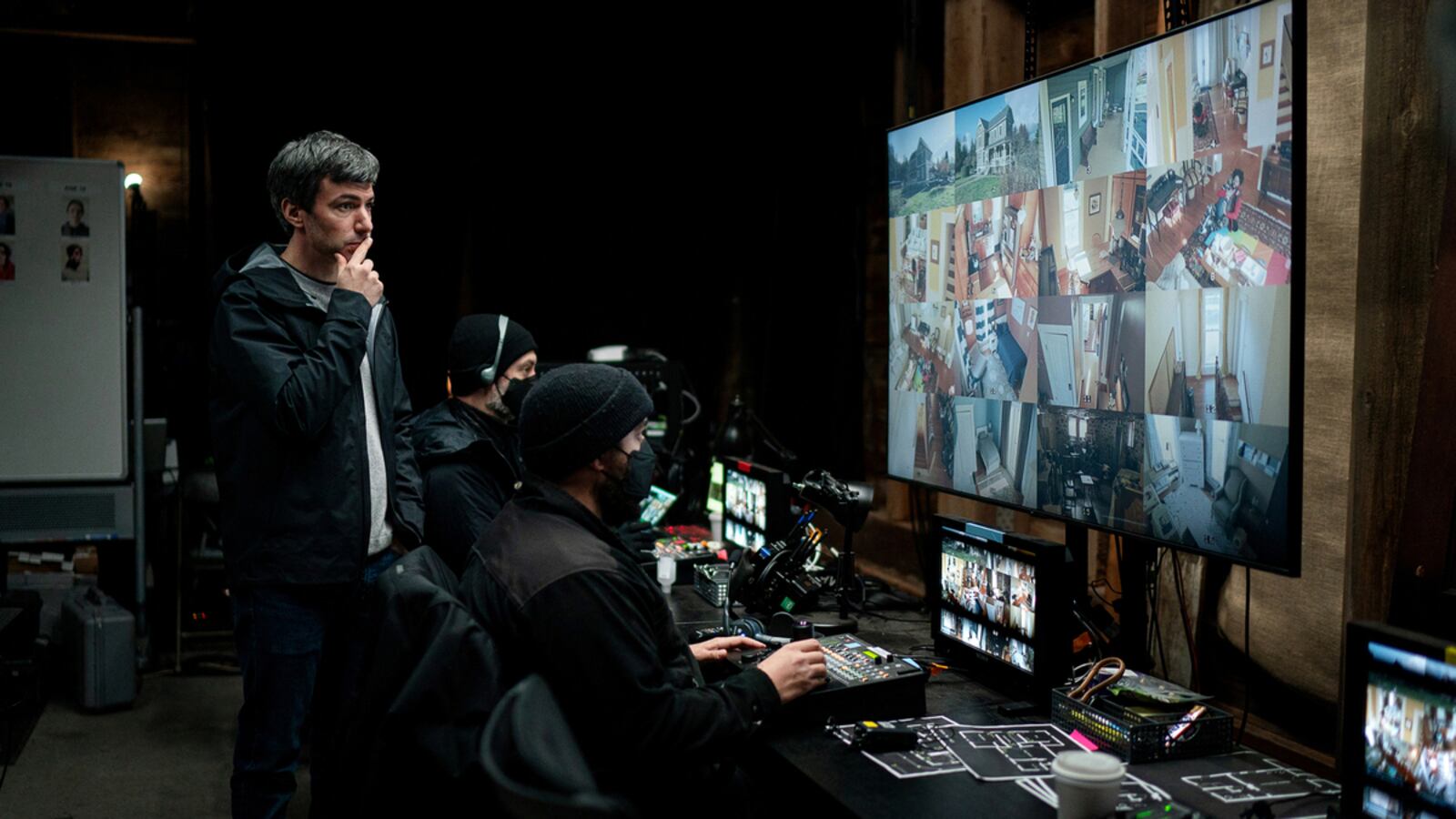In the first episode of The Rehearsal, back when this show seemed like a goofy prank serial rather than a journey into Nathan Fielder's deepest anguishes, our host felt the need to apologize.
The subject, a man named Kor, wants to confess to a friend that he does not, in fact, have a Master's degree. Fielder creates an environment where Kor can practice that admission over and over again with all of the chaotic variables fully in his control, and within that simulation, Fielder begins to feel gross about himself. Kor intends to make the truth known about his educational history during a trivia night at a bar. To keep The Rehearsal airtight, Fielder procures the answers to the questions that will be asked ahead of time, and does his best to inject them into Kor's subconscious.
This is a mild violation of competitive integrity, and Nathan Fielder—a man who has taken advantage of so many people's faith in the goodness of strangers throughout his time in the spotlight—comes clean. He (of course) first rehearses a mea culpa with an artificial Kor, and then deploys the honed version to the man himself. It was a surprisingly somber end, punctuating a deeply silly television premiere.
But now, at the end of the first season of The Rehearsal–with a cavalcade of wiggy characters, psychedelic set designs, and exhausting internet discourse behind us—it is clear that the show is intended to be Fielder's own personal reckoning.
I have been watching the man make television for nearly a decade; he's hoodwinked baristas, antique shop owners, and haunted house promoters with his euphorically unflappable posture. We've marveled at the ramifications, because it's easy to laugh at a few angry, confused Starbucks customers. But the wreckage in The Rehearsal is so much more profound, especially here at the end, when a child actor named Remy begins to believe that Nathan is his real dad.
Remy, of course, is one of the many young boys who have flitted through the show in order to play Adam—the phony son bequeathed to Angela so she can practice the tenets of motherhood. We learn early on in the finale that Nathan and Remy had established a genuine bond; that there was a warmth between them that transcended the limits of the studio.
Back at home, Remy is raised by a single mother, which is perhaps why the boy—who is likely too young to fully understand the emotional suspension required of actors—has developed palpable affections for Fielder. Nathan reciprocates them; he reads Remy bedtime stories and cuddles with him on the living room floor. It's a relationship apart from all of the Potemkin romances and friendships on The Rehearsal; the simulation folding in on itself, merging with reality.
Fielder visits Remy's family at home to set things right. His goal is to reinforce the parameters of The Rehearsal—to rob this child of the tenderness he was previously showering him with—to become Nathan, rather than Daddy. Remy struggles with the transition. At first, he refuses to see Fielder as anything other than a father figure; the make-believe sessions were too sweet to reject.

He has a crayon portrait of the two on the wall. For the first time in the series, The Rehearsal turns gravely serious. A 6-year-old has been deceived, for what end? To add extra ammunition to a bizarre, experimental reality show? So that Fielder can find a few more laughs?
The most heartbreaking part is that Nathan doesn't quite want to let go of his fantasy fatherhood either. In the funniest sequence of the episode, he asks one of the other child-actors—one that he doesn't have the same connection with—if he's a convincing dad. Their response? "I think you're a good scene partner." Ouch.
Taken at face value, The Rehearsal is built around the premise that the rigors of real life might be more palatable if we can prepare for them. Maybe, if we know the trivia answers ahead of time, and have our drink order prepared at the bar, it'll be easier to tell a friend that we've misled them about our Master's degree. But ironically, the finale reveals how the intricacies of the human psyche can never be hedged against; that even in a fully authored environment, where Fielder can summon winter itself with the sheer power of HBO's budget, relationships can become strained, muddied, and impossible to predict.
Fielder prepared for everything, and yet this boy still wanted him to be his dad—and despite himself, he felt the same way. Move heaven and earth, and people will still be capable of hurting other people; on purpose, accidentally, somewhere in between.
Remy eventually moves beyond his Fielder phase. The last time we see him in the episode, he's calling Nathan by his name again, and the statutes of reality and fantasy are back in place. And yet, Fielder isn't fully satisfied. Something still eats at his core.
So he engineers the most audacious simulation we've seen so far in The Rehearsal. Fielder dons the guise of Remy's mother, in an exact replica of her home, with a facsimile of her son close by.
Together, they reenact all of their time spent on the show. They send in an audition tape, they meet a Fielder stand-in, they watch as a strange familial bond grows, and they reckon with the fallout that follows. The show ends with Fielder, dressed as a mother, instructing her factitious child—who is sobbing from the emotional whiplash—that life is better with surprises, that the television host didn't mean to confuse him, that we're all figuring things out along the way.
You could imagine Fielder wanting to say these things to Remy itself, but in this pocket dimension, a rehearsal is the best he can hope for. And yet, the scene breaks. Fielder refers to himself as a dad, despite the fact that he's playing a mom. The child actor corrects him, in a whisper you might use to hint at a lineread on stage. "No," responds Fielder, with a borderline sinister tone. "I'm your dad." The two run off to go play.
Throughout The Rehearsal we watched as Fielder slowly came to terms with the rubble in his wake. But at the moment of truth, he still prioritized his own well-being over everyone else he's wronged. On this show, Fielder's hurt feelings are the only ones that matter. What a fascinating journey into the abyss. It can only get bleaker from here.






